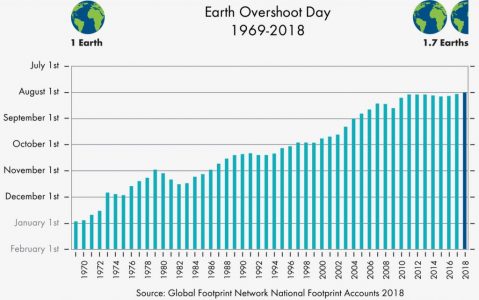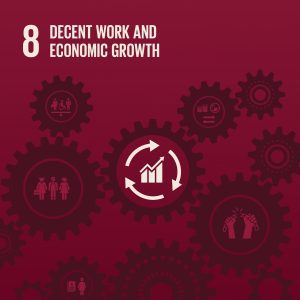“People say they want to have it all. But where would they put it?” Steven Wright
The word “consumption” was used in ancient Greece almost 2,500 years ago to describe the disease pulmonary tuberculosis because the disease appeared to consume the body it had infected. This form of consumption has been largely controlled in the United States although tuberculosis is still a problem worldwide.
Today in the U.S. and other modern economies another form of consumption, the consumption of Earth’s resources driven by consumer spending on an extraordinary range of goods and services, threatens the wellbeing of life on Earth.
Of course, we consume goods and services to survive and thrive, to meet our basic needs and beyond that provide some enjoyment and comfort. The problem is excessive consumption. Consumerism drives us to live beyond the planet’s capacity to provide raw materials and absorb the waste that our overzealous consuming habits generate. As consumerism continues unabated in developed countries, and human population soars past 7.5 billion on its way to a projected 9.7 billion in thirty years, and developing countries strive to emulate consumerism as a way of life, the problem gets worse.
Each year we go deeper into debt as we further erode the endowment of natural capital that supports life on Earth. Instead of living off the interest that Earth’s abundant natural capital provides, we burn through that interest earlier each year and consume ever increasing amounts of this natural endowment, and we have been since at least 1969.
 An Earth Overshoot Day website tracks the day each year “when we (all of humanity) have used more from nature than our planet can renew in the entire year. In 2018, it fell on August 1.”
An Earth Overshoot Day website tracks the day each year “when we (all of humanity) have used more from nature than our planet can renew in the entire year. In 2018, it fell on August 1.”
The five stages of the consumer cycle, extraction, production, distribution, consumption, and disposal, is a linear, take-make-waste system that violates the laws of nature and, at the scale it now operates, creates enormous damage. For an excellent, interesting explanation watch the short video, The Story of Stuff.
This practice and trend is unsustainable and begs many questions. A couple of those questions: “Is all this stuff really necessary? Is the acquisition of so much stuff making us happy?”
I think we all intuitively know the research-verified answers to these questions: No, and no. Advertising effectively tells us the opposite. We are bombarded with messaging that tells us the way to seek value and meaning, the way to fulfill our psychological needs and our self-fulfillment needs (the top of Maslow’s hierarchy of needs), is through the consumption of more and more goods and services. Consequently, consumerism has been accepted as a way of life and as a (profoundly inadequate) proxy for human wellbeing. How did this happen?
After World War II the consumer-driven economy really took off. Economists and policymakers were wondering how to convert America’s prolific wartime economy into a peacetime economy. Retailing analyst Victor Lebow concluded in 1946 (the year after WWII ended) that “Our enormously productive economy… demands that we make consumption our way of life, that we convert the buying and selling and use of goods into rituals, that we seek our spiritual satisfaction, our ego satisfaction, in consumption… we need things consumed, burned up, replaced and discarded at an ever-accelerating rate.”
In 1953, Arthur F. Burns, chairman of President Eisenhower’s Council of Economic Advisors, said that the American economy’s “ultimate purpose is to produce more consumer goods.”
Americans bought in (no pun intended) and Lebow and Burns got the economy they were hoping for.
But is this the economy we want? Does it serve human wellbeing and protect the life-giving processes of the planet? Does anyone really believe our spiritual satisfaction, our ego satisfaction, can be found in “things consumed, burned up, replaced, and discarded at an ever-accelerating rate?” Should the ultimate purpose of the economy be to produce more consumer goods?
True confession: I am no high priest of sustainable consumption. I have a lot of stuff. Too much stuff. Stuff that I really don’t need to be happy, well fed, and comfortable. So it’s not like I am free from this behavior. Yet. I am working at it.
It is important to stress that dialing back consumer spending as a way of life does not mean living meager, hardscrabble lives. On the contrary, a sustainable world is one we all could be happy and secure living in. One where we live within the means of the planet and where the social foundation of human wellbeing is in place. Oxford economist Kate Raworth describes what that kind of an economy would look like in her brilliant book, Doughnut Economics: 7 Ways to Think Like a 21st Century Economist. Check it out!
The point is, we can examine the underlying assumptions we have accepted about the value of making consumerism our way of life and reconnect to things that matter: meaningful experiences, time with family and friends, doing things that serve ourselves, each other, the planet, and the future. We can back away from consumerism, and limit human consumption to what nature can provide.
I’m with Kate Raworth: “The aim of the economy should be meeting the needs of all within the means of the planet.” “Instead of economies that need to grow, whether or not they make us thrive, we need economies that make us thrive, whether or not they grow.”
And I’m with Ray Anderson, founder and former CEO of Interface: “At the end of the day, the role of business is to generate prosperity and a better quality of life for everyone… we should never operate at the expense of the earth or societies or future generations.”
We can create a world where humans and all life thrives, one where life is experienced with sufficiency and wellbeing, one like that envisioned by architect Bill McDonough: “Our goal is a delightfully diverse, safe, healthy and just world, with clean air, water, soil and power – economically, equitably, ecologically and elegantly enjoyed.”
Buying a lot of stuff won’t get us there.
Learn about the SDGs & AU and our contributions related to this post.





